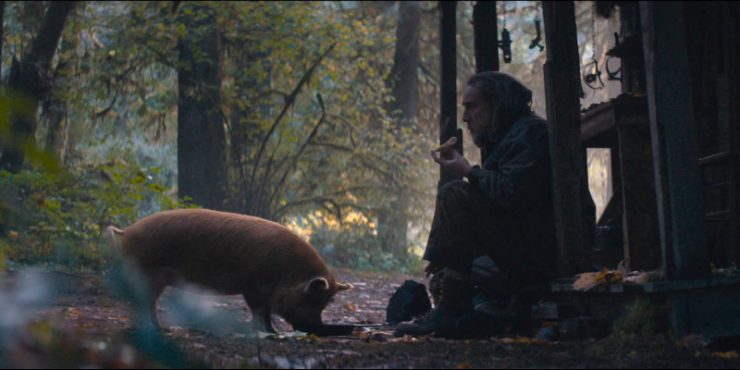The key to Pig is how committed it is to its premise. The absurdity of its story – a man goes on the war path to find his stolen pig – is not played down, but it’s not played for laughs either. Not that there aren’t laughs in Pig, but they usually come from the severity of the performance from Nicolas Cage. Cage, the film’s star, understands every beat in this script. His brooding, blood-splattered protagonist carries the film from beginning to end, holding tightly on a single note of frightening tension throughout. You read the logline to Pig and it sounds like another in Cage’s decades-long dedication to self-parody. But director Michael Sarnoski instead embraces the emotional edges of this story, crafting a haggard tale of grief, recovery and really good truffles.
Cage is Robin Feld, a truffle forager living in a cabin deep in the woods outside of Portland, Oregon. His only companion is a truffle pig who not only helps him find his rare and delicious truffles, but also provides solace for Robin who is still grieving the loss of his wife. A true emotional support animal. Robin’s one consistent visitor, Amir (Alex Wolff), is an enterprising young man whose spotless Camaro and expensive watch projects a level of success that has yet to be achieved. Amir buys Robin’s truffles and sells them to venders in Portland. Their exchanges are cold, even tense. Robin has little time for anything other than his pig, and he bluntly makes that sentiment known.
One night, vandals burst into Robin’s cabin and steal his pig. They also pulverize him with a lead pipe. The moment he awakens the next morning, he is motivated by a singular urge to get his pig back. He tracks down Amir, and forces his young business partner to drive him around Portland tracking down leads that could show him to the whereabouts of his four-legged companion. The film then reveals a dark underworld bubbling beneath the surface of Portland’s fine dining community, a community Robin was once a part of before he became a widower. The deeper Robin goes – the closer he gets to his pig – the more dangerous his journey becomes. Robin suffers several blows to the head, leading to a face caked in dried blood and bloated with swelling, purple bruises. Not once does he clean himself up, wearing the physical and emotional scars that this pighunt has caused him.
At just over 90 minutes, Pig is too spry for deep-seated metaphor, and a lot of credit should be given to Sarnoski for telling this story at face value. It’s persistent, punishing tone (and it’s protagonist’s bloodied face) reminded me of Lynne Ramsay’s You Were Never Here. That film also had its main character travel into violence to rescue an innocent kidnapping victim. That Pig substitutes a truffle big for a young child is not viewed as ironic (though many characters make a point to call out the preposterousness of Robin’s quest) but instead Sarnoski accepts the challenge of earning the audience’s acceptance of Robin’s pain. “I loved her,” Robin explains to Amir. This line is late in the film, and by this time we fully understand the level of intensity in that love.
Nicolas Cage is an incredible actor. This feels like an obvious point, but perhaps it still needs to be said for those who only know him for the meme-inducing insanities that he’s performed in the last two decades. There are a lot of times when his choices as an actor do more to serve his own mythology than the film itself, but no one can deny his talent or commitment to a role. Pig is vintage Cage. Aching vulnerability crudely plastered over frenetic eccentricity. It’s my favorite performance of his in decades, probably since his dual performance in the 2002 masterpiece Adaptation. He’s not someone who needs to prove he can act, but he does have to prove that he can carry a movie and not his own reddit page. He certainly does that in Pig.
Directed by Michael Sarnoski










